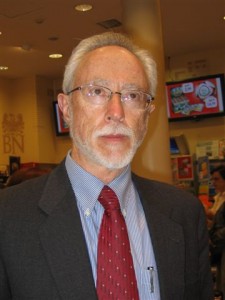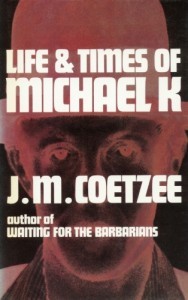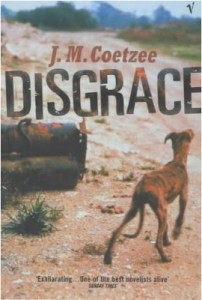Biography

John Maxwell Coetzee, better known as J.M. Coetzee, was born in South Africa to Afrikaner parents on February 9th, 1940. His father worked for the government and also was a sheep farmer. When Coetzee was eight, his father lost the government job due to his differing views from the apartheid government. The family then moved to the provincial town of Worcester.

During his early years, Coetzee studied in Cape Town, where he obtained his BA in 1960 and his MA in 1963 from the University of Cape Town. He subsequently traveled the world working as a systems programmer for International Computers in Bracknell, Berkshire from 1964-1965. He later obtained his PhD in English, linguistics, and Germanic languages from the University of Texas at Austin in 1969. From 1968 to 1971, Coetzee served as an assistant professor of English at SUNY-Buffalo. After being denied permanent residence in the United States, he returned to South Africa, where he held numerous positions at the University of Cape Town between 1972 and 2000. Additionally, between 1984 and 2003, Coetzee taught in the United States. His appointments included stints as Johns Hopkins University, Stanford University, Harvard University, and the University of Chicago, where he served on the Committee of Social Thought for six years.
J.M. Coetzee was married in 1963 and then divorced in 1980. He had a son and daughter from the marriage, but his son was killed in an accident at the age of 23. Coetzee’s separation from his wife before his divorce was widely expected by his friends as many found him a reclusive man. This label was further evidenced by the fact that he did not journey to London to receive the Booker Prize in 1984 for his novel The Life and Times of Michael K or when he again won the honor for his novel Disgrace in 1999.
Author Rian Malan describes Coetzee as:
A man of almost monkish self-discipline and dedication. He does not drink, smoke, or eat meat. He cycles vast distances to keep fit and spends at least an hour at his writing-desk each morning, seven days a week. A colleague who has worked with him for more than a decade claims to have seen him laugh just once. An acquaintance has attended several dinner parties where Coetzee has uttered not a single word. (qtd. in Cowley)
In spite of Coetzee’s solitude, his books have become worldwide bestsellers. Along with Peter Carey, Coetzee is one of only two writers who have won the Booker Prize twice. In 2003, Coetzee was awarded the Nobel Prize in Literature.
Writings
J.M. Coetzee is a writer who is strongly influenced by his own personal background of being born and growing up in South Africa. Although a white writer living in South Africa during apartheid, Coetzee grew to believe in and write with strong anti-imperialist feelings. His international writings tended to set him apart from fellow authors in South Africa, and his writing was said to be mostly influenced by the postmodernist writers of Europe and America. These writers also included many anti-imperialist sentiments as a reaction to the Vietnam war. Many of Coetzee’s personal experiences and beliefs can be seen in his books. Coetzee describes his sense of alienation from fellow Afrikaners in his fictionalized memoir Boyhood: Scenes from Provincial Life (1997). Coetzee also writes about the laws that divided himself and others into racial categories that served to further alienate him (see Apartheid Literature).
This is evidenced in his first novel Dusklands (1974). In this book, Coetzee focuses on two settings: the United States State Department during the Vietnam era and the exploration and conquest of Southern Africa in the 1760’s by a man named Jacobus Coetzee. These two vastly different locations work together to bring out the alarm and paranoia of aggressors no matter what the location and to show the unthinkable ways in which dominant groups impose their ways upon other cultures.

His first novel to win the Booker Prize, The Life and Times of Michael K, is set in Cape Town, a city on the verge of racial wars, and centers around a gardener who attempts to transport his dying mother to the farm of her youth. Although she dies during the journey, Michael K continues on to her farm with her ashes. He lives quite happily in solitude on her old farm until he is captured and accused of aiding guerrillas. The great weight of the novel relies on the fact that it does not focus on racial separation but is more concerned with saving humanity as a whole.
In his Booker Prize-winning novel Disgrace, Coetzee deals with a South African professor named David who goes out to visit his daughter Lucy’s farm after having been found guilty of sexually assaulting a student. While he is there, a gang of two men and one boy rapes his daughter. When he later sees the boy at a party thrown by Lucy’s neighbor Petrus, he demands justice. Petrus refuses and promises protection from further attacks to Lucy only if she marries him. The issues in this novel deal with many of the contemporary concerns of South Africa. Land, crime, rape, lack of police protection, and racial divides are all themes of the novel and problems in modern day South Africa.
All of Coetzee’s writings are similar in that they often center on a solitary character. No direct moral is ever given; rather, situations are set up for the reader to consider. Coetzee’s aim is not to provide solutions but to highlight problems and have the reader form their own conclusions.
Awards
- Central News Agency Literary Award 1978, 1980, 1983
- James Tait Black Memorial Prize, 1980
- Faber Memorial award, 1980
- Booker Prize, The Life and Times of Michael K, 1983
- Fémina Prize (France), 1985
- Jerusalem Prize, 1987
- Sunday Express Book of the Year Award, 1990
- Mondello Prize (Italy), 1994
- D.Litt., University of Strathclyde, Glasgow, 1985
- Life Fellow, University of Cape Town
- Fellow, Royal Society of Literature, 1988
- Honorary Fellow, Modern Language Association, 1989
- Booker Prize, Disgrace, 1999
- Nobel Prize in Literature, 2003
Works
Novels
- Coetzee, J.M. Dusklands. Johannesburg: Ravan Press, 1974.
- —. From the Heart of the Country. New York: Harper, 1977.
- —. Waiting for the Barbarians. New York: Penguin Books, 1982.
- —. The Life and Times of Michael K. New York: Viking, 1984.
- —. Foe. New York: Viking, 1987.
- —. Age of Iron. New York: Random House, 1990.
- —. The Master of Petersburg. New York: Viking, 1994.
- —. Disgrace. New York: Viking Penguin, 2000.
- —. Elizabeth Costello. New York: Penguin, 2003.
- —. Slow Man. New York: Penguin, 2005.
- —. The Diary of a Bad Year. New York: Penguin, 2007.
- —. The Childhood of Jesus. London: Jonathan Cape, 2013.
- —. The Schooldays of Jesus. London: Harvill Secker, 2016.
Selected Other Writings
- Coetzee, J.M. White Writing: On the Culture of Letters in South Africa. New Haven: Yale University Press, 1988.
- —. Doubling the Point. Cambridge: Harvard University Press, 1992.
- —. Editor, with André Brink, A Land Apart: A South African Reader. London: Faber, 1986.
- —. Translator, A Posthumous Confession by Marcellus Emants. Boston: Twayne, 1976.
- —. Translator, The Expedition to the Baobab Tree by Wilma Stockenström. Johannesburg: Ball, 1983.
- —. Boyhood: Scenes from Provincial Life. New York City: Viking, 1997.
Works Cited
- “J(ohn) M(ichael) Coetzee.” Contemporary Authors Online. New York: The Gale Group, 2000. Biography Resource Center.
- “J.M. Coetzee.” Contemporary Novelists, 6th ed. New York: St. James Press, 1996. Biography Resource Center.
- “J.M. Coetzee.” Encyclopedia of World Biography, 2nd ed. 17 Vols. New York: Gale Research, 1998. Biography Resource Center.
- Cowley, Jason. “The Ideal Chronicler of the New South Africa, He Deserves to Make Literary History as a Double Booker Winner.” New Statesman, 1996. Biography Resource Center.
Author: Jonathan Price, Fall 2000
Last edited: May 2017
1 Comment
Coetzee is a great writer to read. I’ve selected his some of his novels for my PhD.